Mediocrity Breeds Contempt: Film Festivals Part II
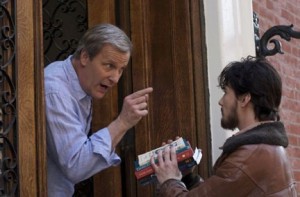 As mentioned in part I of this series (which you can read here), there’s an eagerness for an audience to fall in love with some hidden gem at a film festival, especially a smaller one. This was hammered home with The Answer Man (also known as Arlen Faber), which got a featured spot in the Philadelphia Film Festival, not because it has a mid-level cast of Jeff Daniels, Lauren Graham, Kat Dennings, Tony Hale, and Olivia Thirlby, but because it was shot in Philadelphia, automatically endearing itself to the hometown crowd. This is the common effect of homerism, ignoring many obvious flaws to concentrate on the minimal positives. The question and answer period with the filmmakers after the screenings is always fascinating for this reason, one woman asked the writer/director of The Answer Man, John Hindman, how he had captured Philadelphia so well visually, which is odd considering at least 95% of the movie’s scenes are interior, and only the romantic comedy false crisis conclusion shows much of the city, meaning that it could have been shot just about anywhere (indeed, Hindman said that they originally planned to shoot the movie in LA, but the tax breaks were better in Philadelphia).
As mentioned in part I of this series (which you can read here), there’s an eagerness for an audience to fall in love with some hidden gem at a film festival, especially a smaller one. This was hammered home with The Answer Man (also known as Arlen Faber), which got a featured spot in the Philadelphia Film Festival, not because it has a mid-level cast of Jeff Daniels, Lauren Graham, Kat Dennings, Tony Hale, and Olivia Thirlby, but because it was shot in Philadelphia, automatically endearing itself to the hometown crowd. This is the common effect of homerism, ignoring many obvious flaws to concentrate on the minimal positives. The question and answer period with the filmmakers after the screenings is always fascinating for this reason, one woman asked the writer/director of The Answer Man, John Hindman, how he had captured Philadelphia so well visually, which is odd considering at least 95% of the movie’s scenes are interior, and only the romantic comedy false crisis conclusion shows much of the city, meaning that it could have been shot just about anywhere (indeed, Hindman said that they originally planned to shoot the movie in LA, but the tax breaks were better in Philadelphia).
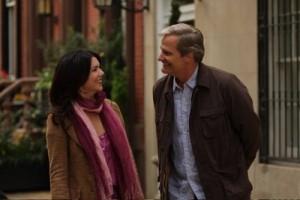 Now there’s nothing wrong with taking advantage of a city’s financial benefits in order to get your small movie funded, but since I have no particular allegiance with Philadelphia (I haven’t lived here long enough for that), it felt very odd to hear the oohs and ahhs when a location was recognized by the audience, and the overlaughing at jokes that didn’t even appear to intend to be a big laugh. My attempt at objectivity created a separation and an inability to fall for The Answer Man‘s manipulative charms. It is a shame, because the movie has a reasonable premise, a man writes a book called Me and God suggesting that God spoke to him and answered all of the burning questions of the universe, and the public buys into it completely, turning the book into a sensation, and forcing the man (Jeff Daniels) into exile to avoid being constantly hassled by the public seeking answers about their personal dilemmas. Daniels hides out for twenty years, collecting residuals, putting off writing a follow-up, and becoming a miserable hermit, until his identity is accidentally exposed, partially via a back injury. A chiropractor, played by Lauren Graham, works on Daniels’ injured back and they start the inevitable romance. The pieces are obvious, Graham is the sweet, divorced, emotionally cautious woman with a twitchy Bewitched-style nose and a son (Daniels describes a child’s viewpoint as “a world filled with giants”), and Daniels is the miser who needs to convert into a reasonable person who can relate to the world, and become the surrogate father for the child. A movie that basically writes itself.
Now there’s nothing wrong with taking advantage of a city’s financial benefits in order to get your small movie funded, but since I have no particular allegiance with Philadelphia (I haven’t lived here long enough for that), it felt very odd to hear the oohs and ahhs when a location was recognized by the audience, and the overlaughing at jokes that didn’t even appear to intend to be a big laugh. My attempt at objectivity created a separation and an inability to fall for The Answer Man‘s manipulative charms. It is a shame, because the movie has a reasonable premise, a man writes a book called Me and God suggesting that God spoke to him and answered all of the burning questions of the universe, and the public buys into it completely, turning the book into a sensation, and forcing the man (Jeff Daniels) into exile to avoid being constantly hassled by the public seeking answers about their personal dilemmas. Daniels hides out for twenty years, collecting residuals, putting off writing a follow-up, and becoming a miserable hermit, until his identity is accidentally exposed, partially via a back injury. A chiropractor, played by Lauren Graham, works on Daniels’ injured back and they start the inevitable romance. The pieces are obvious, Graham is the sweet, divorced, emotionally cautious woman with a twitchy Bewitched-style nose and a son (Daniels describes a child’s viewpoint as “a world filled with giants”), and Daniels is the miser who needs to convert into a reasonable person who can relate to the world, and become the surrogate father for the child. A movie that basically writes itself.
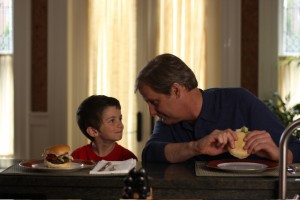 And yet despite The Answer Man being part of a fantasy world where the general public recognizes authors (how many authors would you recognize on the street? Stephen King, and? Daniels’ character is not Greta Garbo or J.D. Salinger) and hound them for advice, or where characters are always malleable enough to adjust to the pertinent plot point, and a confusing tone that doesn’t know whether it endorses Daniels’ new age aphorisms or mocks them, or Kat Dennings playing another in a long line of distant goth girls, I really wanted to like the movie. The Answer Man is sincere hokum and patronizing, but it is still the same exact story as As Good As It Gets (minus the narratively convenient sexless gay friend, he’s been replaced by an alcoholic) and a lot shorter than James L. Brooks overpraised and bloated film. The Answer Man has some decent dialogue (“so you’re only awful to people who don’t have problems?”) but is weighed down by the plot mechanics and the cynical condescension of the story where everything fits far too neatly into a bogus, impersonal formula.
And yet despite The Answer Man being part of a fantasy world where the general public recognizes authors (how many authors would you recognize on the street? Stephen King, and? Daniels’ character is not Greta Garbo or J.D. Salinger) and hound them for advice, or where characters are always malleable enough to adjust to the pertinent plot point, and a confusing tone that doesn’t know whether it endorses Daniels’ new age aphorisms or mocks them, or Kat Dennings playing another in a long line of distant goth girls, I really wanted to like the movie. The Answer Man is sincere hokum and patronizing, but it is still the same exact story as As Good As It Gets (minus the narratively convenient sexless gay friend, he’s been replaced by an alcoholic) and a lot shorter than James L. Brooks overpraised and bloated film. The Answer Man has some decent dialogue (“so you’re only awful to people who don’t have problems?”) but is weighed down by the plot mechanics and the cynical condescension of the story where everything fits far too neatly into a bogus, impersonal formula.
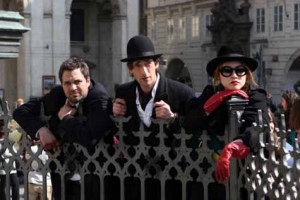 An impersonal formula is also what hurts Rian Johnson’s follow-up to his brilliant Brick, the Wes Anderson clone The Brothers Bloom. Why is it a Wes Anderson doppelganger (or, why has it been on the shelf for a year)? It could be the camerawork and antic editing, the Harold and Maude style musical choices, the variation on Bottle Rocket’s 50 year plan, the style of slapstick used, the shallow, disaffected characters, the kooky silent foreigner, the pompous blowhard to be laughed at (in this case, Robbie Coltrane) or the casting of Adrien Brody, who was in Anderson’s last film The Darjeeling Limited. While all of those reasons created a true sense of deja-vu, what really struck me was the mixing of time periods, where the movie seems taking place in the 1950’s and the present era simultaneously, and the very specific aping of the French New Wave of the 1960’s (Godard, Truffaut especially) that Anderson excels at, and the way Anderson seems to make his characters caricatures of caricatures, reveling in ironic distance but still hoping that you’re emotionally invested. Johnson’s choice to take so much from Wes Anderson is so strange, since Anderson’s style is unmistakable and immediately identifiable, more so than any current filmmaker.
An impersonal formula is also what hurts Rian Johnson’s follow-up to his brilliant Brick, the Wes Anderson clone The Brothers Bloom. Why is it a Wes Anderson doppelganger (or, why has it been on the shelf for a year)? It could be the camerawork and antic editing, the Harold and Maude style musical choices, the variation on Bottle Rocket’s 50 year plan, the style of slapstick used, the shallow, disaffected characters, the kooky silent foreigner, the pompous blowhard to be laughed at (in this case, Robbie Coltrane) or the casting of Adrien Brody, who was in Anderson’s last film The Darjeeling Limited. While all of those reasons created a true sense of deja-vu, what really struck me was the mixing of time periods, where the movie seems taking place in the 1950’s and the present era simultaneously, and the very specific aping of the French New Wave of the 1960’s (Godard, Truffaut especially) that Anderson excels at, and the way Anderson seems to make his characters caricatures of caricatures, reveling in ironic distance but still hoping that you’re emotionally invested. Johnson’s choice to take so much from Wes Anderson is so strange, since Anderson’s style is unmistakable and immediately identifiable, more so than any current filmmaker.
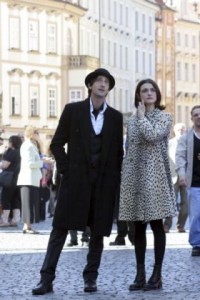 Since Brick was so original and clever in its dissection of film noir (by placing it in a high school), why would Johnson deliberately choose the derivative route? It isn’t as if the story, two conmen (Adrien Brody, Mark Ruffalo), also brothers, who engage in elaborate schemes, and in “their last job” attempt to take down, a bored, lonely rich girl (Rachel Weisz), needed to be told in a Wes Anderson way. Johnson’s influences are clear; he has Ricky Jay do the narration (like in Paul Thomas Anderson’s Magnolia), the tone of the film verges on vaudeville Robert Altman, and there’s a clever redux of David Mamet’s House of Games detailing the behind the scenes of a scam, but that’s all they are, references. Everything in The Brothers Bloom is so planned and controlled, that there’s no breathing room for the characters, and since the movie is just one of those “when does the con end?” films, there’s no way to connect to anyone, especially as there’s an extra twenty minutes of “are we still playing a game” trickery at the end, when, as an audience, we’re already exhausted. The Brothers Bloom is so artificial, and intentionally so, it can’t possibly expect us to care about the dramatic outcome (it might have worked had it played as comedy alone, which the movie does for awhile), or believe that Adrien Brody would ever think his brother had stopped playing pranks on him, so the obvious romance between Weisz and Brody has false obstacles constructed to pad out an already overlong film, that one wonders if the entire movie is just a way for Johnson to get all of his hero-worship homages and film school tricks out of his system so he can move on to a real project.
Since Brick was so original and clever in its dissection of film noir (by placing it in a high school), why would Johnson deliberately choose the derivative route? It isn’t as if the story, two conmen (Adrien Brody, Mark Ruffalo), also brothers, who engage in elaborate schemes, and in “their last job” attempt to take down, a bored, lonely rich girl (Rachel Weisz), needed to be told in a Wes Anderson way. Johnson’s influences are clear; he has Ricky Jay do the narration (like in Paul Thomas Anderson’s Magnolia), the tone of the film verges on vaudeville Robert Altman, and there’s a clever redux of David Mamet’s House of Games detailing the behind the scenes of a scam, but that’s all they are, references. Everything in The Brothers Bloom is so planned and controlled, that there’s no breathing room for the characters, and since the movie is just one of those “when does the con end?” films, there’s no way to connect to anyone, especially as there’s an extra twenty minutes of “are we still playing a game” trickery at the end, when, as an audience, we’re already exhausted. The Brothers Bloom is so artificial, and intentionally so, it can’t possibly expect us to care about the dramatic outcome (it might have worked had it played as comedy alone, which the movie does for awhile), or believe that Adrien Brody would ever think his brother had stopped playing pranks on him, so the obvious romance between Weisz and Brody has false obstacles constructed to pad out an already overlong film, that one wonders if the entire movie is just a way for Johnson to get all of his hero-worship homages and film school tricks out of his system so he can move on to a real project.



